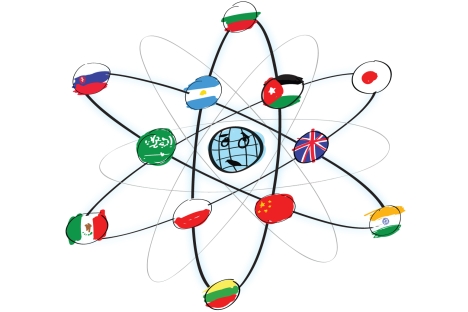Catching up with the global energy demand

Drawing by Niyaz Karim. Click to enlarge the image.
According to the International Energy Agency (IEA), global demand for energy will increase more than 33 percent by 2035. And following Germany’s decision to abandon its nuclear industry by 2020, electricity costs will be 1.5 times higher in Europe than the U.S. by 2030.
These facts create new challenges regarding the future of energy. We need to find ways to meet increasing demand but at the same time address the environmental problems, such as carbon dioxide emissions and global warming, and the safety issues that arose in the wake of Fukushima.
So, do we invest in renewable energy, fossil fuels, shale gas, nuclear energy, or others, such as solar and wind power? Or do we need a combination of all of these energy sources?
According to the IEA, solar and wind power will increasingly become part of the energy mix, but might not be generated in significant enough quantities to help meet the demand in 20 years. So traditional energy sources will continue to be produced and shale gas will increasingly be extracted – despite some of the problems associated with it, including accidents and pollution reported in Mexico.
After Fukushima, there was an understandable concern about the potential risks of nuclear power plants. Investigations into the accident have concluded that it was not caused by a technical error but caused by human error: an underestimation of the potential risk posed by a tsunami.
This conclusion, however, does not justify any underestimation of the risks linked to nuclear industry. An accident at any nuclear power plant – no matter who the operator is – adversely affects the industry worldwide. Although its lack of C02 emissions is a strong argument in favour of nuclear power, the pre-occupation with safety needs to be addressed before nuclear energy can be developed further.
And that is why all nuclear countries have introduced stress tests to ensure plants can withstand natural disasters. Russia also extended its stress tests to make sure its plants could withstand terrorism attacks. Following the publication of the test results, nuclear operators have had to invest millions to meet stringent safety measures.
Parameters of safety are constantly evolving. With this in mind, it would be useful to have an international body that would ensure all nuclear plants abide by strict safety and security standards. This body would also help address the sometimes unfounded concerns about nuclear energy that often lead to misunderstandings and half-built nuclear plants.
In Lithuania, for example, plans to build a new nuclear plant have been put on hold after a referendum revealed that 63 percent of the population did not want it. And in Bulgaria, Rosatom signed a deal to build a plant at Belene, but the plant was abandoned before it was built. The construction was completed. Rosatom is seeking compensation.
But some countries are actively developing nuclear energy. They include not only European countries such as the UK, Poland, Czech Republic, Slovakia and Russia, but India, Turkey, China, South Africa, Argentina, Saudi Arabia, Jordan and some African countries.
Rosatom is, for example, involved in 38 new projects and is planning to boost nuclear power from 16 percent of its total energy production to 25 percent in the next 20 years. Saudi Arabia, despite being the world’s biggest oil producer, is also planning to build two nuclear power plants in the near future to complement its fossil fuel industry – not replace it.
Competition to build the reactors at the Temelin nuclear plant in the Czech Republic is strong. The French Areva, the American Westinghouse and the Russian-Czech alliance Skoda-Rosatom are all bidding to win the tender.
One thing is certain: Fukushima marked the end of low-cost nuclear energy production by reinforcing the need for the highest standards in safety and security. France is trying to promote a safety and security authority on a European scale: but the industry needs a world-wide authority.
Energy is one of the most important challenges we face and it doesn’t only concern the “old world”, but the new world in which all countries are looking for internal growth. All sources of energy will have to be used to meet growing demand and the involvement of traditional fossil-fuel producers in new energy resources, such as nuclear and renewable, demonstrates how different sources of energy are complementary to each other and not in competition.
Emmanuel Gout is an energy analyst at international consulting alliance Strativest
All rights reserved by Rossiyskaya Gazeta.
Subscribe
to our newsletter!
Get the week's best stories straight to your inbox
